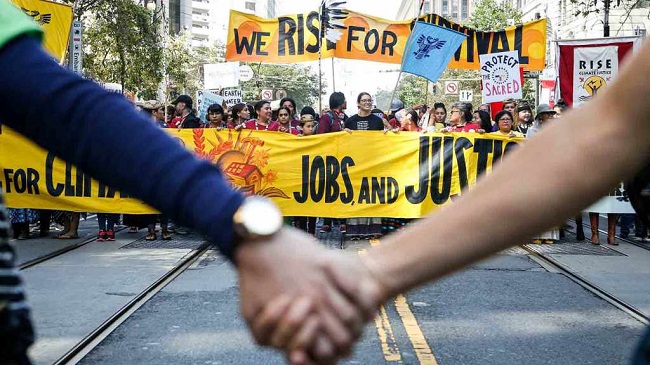The special report on Land and Climate Change released by the Intergovernmental Panel on Climate Change (IPCC) on Thursday, August 8, 2019 confirms that unless the world starts phasing out fossil fuels immediately, the consequences on land and food systems will be dire, and they will hit the most vulnerable the hardest.

According to 350Africa.org, the findings of the report, backed by government representatives gathered in Geneva, have far-reaching implications for how the climate crisis and biodiversity loss are addressed.
The group notes that, with political tensions over questions of land ownership and expropriation in South Africa and the impacts of climate change on land in communities all over Africa, the report is crucial in highlighting the reality faced by millions of Africans who depend on the land for food production.
Climate change and the resulting increase in degradation of fertile land will further impact a population ravaged by famine, desertification and in some instances displacement while the fossil fuel industry continues business as usual, stresses the organisation.
Glen Tyler-Davies, South Africa team leader for 350Africa.org, said, “Fossil fuel companies create large scale land dispossession and transfer vast tracts of land from food to energy production. In the process they also leave a massive trail of environmental destruction. Six out of the 20 countries most vulnerable to climate change are countries in Africa and the impacts are being felt everyday by a vulnerable population. This report should be a wakeup call for African governments to take decisive action in addressing the knock-on effect of climate change, land dispossession and fossil fuel extraction and use.
“There is a significant risk that false solutions to the climate crisis will add even more pressure to our ailing land and biodiversity systems. According to the latest scientific evidence summarised in the IPCC report, if global temperatures surpass the 1.5°C threshold, large scale deployment of carbon capture technology and production of energy using biomass might end up reducing arable land at a time when the combined impacts of climate change and land degradation will reduce yields in large parts of the planet.”
Mahir Ilgaz, Research and Grants Coordinator at 350.org, stated: “Unless we start substantially reducing fossil fuel use now and go completely fossil free by 2050, the combination of climate change and land degradation will lock even more people into poverty and exposure to climate impacts. The more carbon dioxide and methane we emit now, the higher the risks of breakdown in our food systems, especially in vulnerable areas. Continuing investments in fossil fuels and fossil fuel extraction, at this point, equals indirectly starving poor people.
“The longer we wait to cut off fossil fuels, the more emissions will need to be offset, the larger the trade-offs will be of using arable land to compensate for the gap in fossil fuel availability and to capture CO2. At the same time, sustainably managing land will be a keyway to cut emissions and reduce the impacts of climate change. We will need to pursue options that do not force people off their lands and do not swap biodiversity with more monocultures and industrial agriculture.
“Women in Africa are among the most vulnerable to the heightened pressure of land degradation and are instrumental in implementing sustainable practices and solutions already available such as sustainable land management, equitable access to land and land tenure rights, protection of vulnerable ecosystems. Indigenous knowledge has formed the backbone of rural livelihoods for centuries, preserved biodiversity and ensured long-term sustainability of natural resources.
“Governments need to develop effective policies centring indigenous and traditional knowledge that can hold the key to how land degradation and climate adaptation can be addressed at the same time. Although many studies have been carried out on indigenous culture and ethnomedicine, indigenous farming approaches have received insufficient attention”
The IPCC special report on Land and Climate Change is one of two reports coming out in 2019 as follow-up to the landmark 1.5°C report released last October. The second one, a special report on the Oceans and the Cryosphere, is scheduled to be released in late September.
In response to the evidence of the 1.5°C report, 350.org developed a People’s Dossier on 1.5°C highlighting 13 stories of local resistance to fossil fuels by vulnerable communities.
